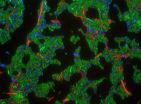HIV testing among older adults is declining, despite CDC recommendation
2015-08-27
(Press-News.org) Researchers led by the UCLA Fielding School of Public Health examined HIV testing trends among adults ages 50 through 64 both before and after 2006, when the Centers for Disease Control and Prevention (CDC) recommended that most doctors automatically screen all patients for HIV regardless of whether they have symptoms.
The researchers found that gains in HIV testing were not sustained over time. Levels of engagement in HIV risk behaviors remained constant, yet testing decreased among this age group from 5.5 percent in 2003 to 3.6 percent in 2006. It increased immediately after the CDC's recommendation to about 4.5 percent, but then fell to 3.7 percent after 2009. Testing increased over this period only among non-Hispanic blacks and those with a recent doctor visit.
This is one of two recent studies by the same group of researchers into HIV testing among older adults. The previous study found that HIV testing prevalence was less than 5 percent, varied by race and ethnicity, and decreased with age, with the oldest older adults, whites, and older women least likely to be tested. Overall these studies highlight the fact that more than 90 percent of people in this age group, with whom they are most likely to develop sexual or social relationships, are not receiving HIV screening as the CDC recommends. The key message for adults age 50 and older is that they may need to advocate for themselves during doctor visits in order to receive the HIV screening CDC considers essential for nearly all adults. This may be especially important for people who are not in high risk groups, as prior evidence shows that a substantial minority of such persons are living with undiagnosed HIV infection.
INFORMATION:
AUTHORS: Chandra L. Ford of the UCLA Fielding School of Public Health, Dionne C. Godette of the National Institutes of Health, Mesfin S. Mulatu of the Centers for Disease Control and Prevention, and Tommi L. Gaines of UC San Diego.
JOURNAL: The peer-reviewed journal Public Health Reports.
ELSE PRESS RELEASES FROM THIS DATE:
2015-08-27
It's bacteria against bacteria, and one of them is going down.
Two UC Santa Barbara graduate students have demonstrated how certain microbes exploit proteins in nearby bacteria to deliver toxins and kill them. The mechanisms behind this bacterial warfare, the researchers suggest, could be harnessed to target pathogenic bacteria. Their findings appear in the Proceedings of the National Academy of Sciences.
Lead authors Julia L.E. Willett and Grant C. Gucinski have detailed how gram-negative bacteria use contact-dependent growth inhibition (CDI) systems to infiltrate ...
2015-08-27
Some children react more strongly to negative experiences than others. Researchers from the Norwegian University of Science and Technology (NTNU) have found a link between aggression and variants of a particular gene.
But children who react most aggressively also tend to respond more strongly to good experiences, the Norwegian researchers found. These children's mood swings have deeper valleys, but also greater peaks.
Aggression is common in young children. Aggressive behaviour increases until children are around 4 years old, and then gradually subsides.
Research ...
2015-08-27
PROVIDENCE, R.I. [Brown University] -- A study provides multiple lines of new evidence that pigments and the microbodies that produce them can remain evident in a dinosaur fossil. In the journal Scientific Reports, an international team of paleontologists correlates the distinct chemical signature of animal pigment with physical evidence of melanosome organelles in the fossilized feathers of Anchiornis huxleyi, a bird-like dinosaur that died about 150 million years ago in China.
The idea that melanosomes, which produce melanin pigment, are preserved in fossils has been ...
2015-08-27
Physicists have found a radical new way confine electromagnetic energy without it leaking away, akin to throwing a pebble into a pond with no splash.
The theory could have broad ranging applications from explaining dark matter to combating energy losses in future technologies.
However, it appears to contradict a fundamental tenet of electrodynamics, that accelerated charges create electromagnetic radiation, said lead researcher Dr Andrey Miroshnichenko from The Australian National University (ANU).
"This problem has puzzled many people. It took us a year to get this ...
2015-08-27
COLUMBUS, Ohio - Many clinical trials use genome sequencing to learn which gene mutations are present in a patient's tumor cells. The question is important because targeting the right mutations with the right drugs can stop cancer in its tracks. But it can be difficult to determine whether there is evidence in the medical literature that particular mutations might drive cancer growth and could be targeted by therapy, and which mutations are of no consequence.
To help molecular pathologists, laboratory directors, bioinformaticians and oncologists identify key mutations ...
2015-08-27
A study by the University of Liverpool has found that the genetic diversity of wild plant species could be altered rapidly by anthropogenic climate change.
Scientists studied the genetic responses of different wild plant species, located in a natural grassland ecosystem near Buxton, to a variety of simulated climate change treatments--including drought, watering, and warming--over a 15-year period.
Analysis of DNA markers in the plants revealed that the climate change treatments had altered the genetic composition of the plant populations. The results also indicated a ...
2015-08-27
Twitter offers a public platform for people to post and share all sorts of content, from the serious to the ridiculous. While people tend to share political information with those who have similar ideological preferences, new research from NYU's Social Media and Political Participation Lab demonstrates that Twitter is more than just an "echo chamber."
The research is published in Psychological Science, a journal of the Association for Psychological Science.
"Platforms like Twitter or Facebook are creating unprecedented opportunities for citizens to communicate with ...
2015-08-27
Philadelphia, PA, August 27, 2015 - About 3% of colorectal cancers are due to Lynch syndrome, an inherited cancer susceptibility syndrome that predisposes individuals to various cancers. Close blood relatives of patients with Lynch syndrome have a 50% chance of inheritance. The role that PMS2 genetic mutations play in Lynch syndrome has been underestimated in part due to technological limitations. A new study in the Journal of Molecular Diagnostics describes a multi-method strategy to overcome existing technological limitations by more accurately identifying PMS2 gene mutations, ...
2015-08-27
Needham, MA.-JBJS Case Connector, an online case report journal published by The Journal of Bone and Joint Surgery, has issued a "Watch" regarding relatively rare but potentially catastrophic complications from failure of modular head-neck prostheses commonly used in hip-replacement surgery.
The arthroplasty community currently feels that the advantages gained from modularity in hip implants outweigh the risks, but this Watch raises that risk-benefit question again. The decision to issue the Watch was prompted by a case report by Swann et al. in the August 26, 2015 JBJS ...
2015-08-27
Analysis of blood samples from more than 5,000 people suggests that a more sensitive version of a blood test long used to verify heart muscle damage from heart attacks could also identify people on their way to developing hypertension well before the so-called silent killer shows up on a blood pressure machine.
Results of the federally funded study, led by Johns Hopkins investigators, found that people with subtle elevations in cardiac troponin T -- at levels well below the ranges detectable on the standard version of this "heart attack" test -- were more likely to be ...
LAST 30 PRESS RELEASES:
[Press-News.org] HIV testing among older adults is declining, despite CDC recommendation



